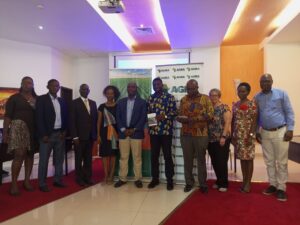In a bid to boost the Ghanaian agricultural production amid fears of impending food insecurity due to global fertiliser shortage as a result of the Russia—Ukraine war, the Alliance for a Green Revolution in Africa (AGRA) is intensifying its support to the local organic fertiliser industry by introducing a set of guidelines to transform, not only the output market, but the whole agriculture and food sector.
Ghana’s organic fertiliser sub-sector has been growing in the past few years with the setting up and operationalisation of large-scale production plants in the Greater Accra and Ashanti Regions. In addition, many individuals have been producing organic fertilisers on a small to medium-scale for many years to farmers although some are unregulated.
With the current inorganic fertiliser crisis, the production and use of organic fertilizer are on the rise. Although there is an overarching law and regulations for the fertiliser sector, it is largely skewed toward the inorganic fertilisers which form a large percentage of the fertilisers used in Ghana, hence, it is imperative that some guidelines are developed for the budding organic fertiliser sector.
Speaking at a ceremony to handover and create awareness on the guidelines in Accra, Dr. Lionel Axel Kadja, Regional Head for West Africa, AGRA, said it will provide the minimum rules for the production and distribution of organic fertilisers, indicate the registration procedures and requirements for an entity to be classified as an organic fertiliser producer, the sampling and testing regime of organic fertilisers, and other ancillary guidelines for the sector.
 “These guidelines will be a key tool for fertiliser inspectors and analysts who will regulate quality control of output products that are distributed to farmers, and will guarantee balanced and quality products in the Ghanaian market for smallholder farmers’ use and for export,” he stated.
“These guidelines will be a key tool for fertiliser inspectors and analysts who will regulate quality control of output products that are distributed to farmers, and will guarantee balanced and quality products in the Ghanaian market for smallholder farmers’ use and for export,” he stated.
Need to increase top-quality agricultural input uptake
Addressing the need for the increase in top quality agricultural input uptake at farmer and industry levels, Dr. Kadja explained that the West African Agricultural sector is ripe for an increased uptake of fertilisers. “Fertiliser use in West Africa remains the lowest globally with an average below 20kg/ha. With the nutrients depletion currently observed, this is a critical factor to consider if we are to increase yields and thereby output, and reduce import bills of a certain number of key commodities,” he stated.
The Director of Plant Protection and Regulatory Services Directorate (PPRSD) at the Ministry of Food and Agriculture (MOFA), Eric Bentsil Quaye, said the current world crisis on mineral fertilisers brought about a renewed interest in the production and use of organic fertilisers in the country, becoming imperative, therefore, for a guideline to be developed to complement the Fertilizer Act and Regulations for the fertiliser sector which has been largely skewed toward the inorganic fertilisers, which forms a large percentage of the fertilisers used in Ghana.
“It is against this background that the Plant Protection and Regulatory Services Directorate (PPRSD) of the MOFA, as the national regulator of fertilisers, requested the assistance of Alliance for Green Revolution in Africa (AGRA), with USAID as sponsors, to develop the Organic Fertiliser Guidelines for Ghana,” he stated.
“The guideline covers procedures for setting up organic fertiliser production facilities registration procedures for organic fertilisers, sampling, physical and chemical test methods, and management of waste at organic fertiliser production facilities,” he added.











